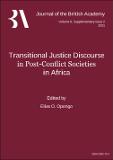| dc.description.abstract | African Union’s Transitional Justice Policy (AUTJP) acknowledges that conflicts affect women and girls disproportionately. Implied in this is the need for transitional processes that take into account the gendered nature of conflicts as well as the role of women in contributing to peacebuilding processes and transitional mechanisms. The article contextualises transitional justice within the framework of gender and grass-roots peacebuilding. From both theoretical and empirical perspectives, the article discusses snippets that depict women as contributors to peacebuilding and transitional justice mechanisms in Kenya’s North Rift conflicts. The study shows that women have used responsibility in burdens; advocacy; membership in village peace committees; negotiation with patriarchy; sensitisation and memorialisation; and socio-economic empowerment, as approaches to build peace and transition communities at the grass-roots level. These efforts feed into transitional justice’s tenets of peace processes, reconciliation, social cohesion, memorialisation, and local ownership. The paper illustrates the need for peacebuilders to focus more on integrating women’s voices in local and mainstream peacebuilding mechanisms. | en_US |

